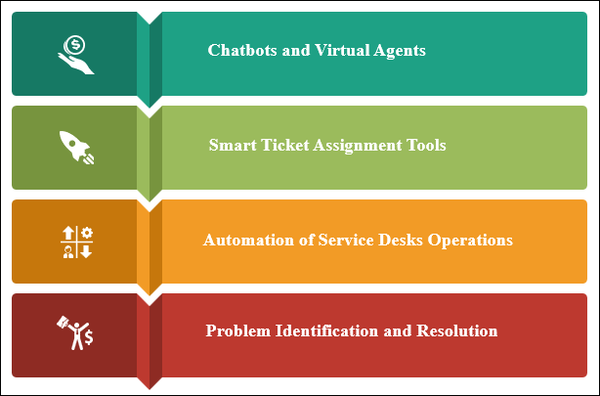The advancement of technology has changed how a business operates, from designing a new product to interacting with its target audience. Artificial Intelligence (AI) has been used in every aspect of business, including IT service management.
What Is AISM?
AI has paved the way for an IT Service Management transformation with promises of redefining the norm and accelerating service delivery. More IT companies are employing the tools of AI to improve their IT service management operations, from cutting down resolution time to freeing up valuable talent within an organization. When IT Services use AI to solve challenges and attain solutions, it is called Artificial Intelligence Service Management or AISM.
How Does AISM Work?
The main focus area of AI service management is proactive prevention, innovation, and enhanced user experience. Artificial Intelligence automates trivial tasks, improves data analysis and correlation, facilitates accurate anomaly detection, and more.
AI can interpret and respond to requests accurately, identify root causes behind events, and predict patterns in behavior and performance. AISM reduces inefficiency not only at service desks but throughout the organization by:
- Eliminating burdensome administrative tasks and delays in problem resolutions.
- Smoothening the workflow through automation and technology.
- Proactive identification of problems and IT issues that diminish user satisfaction.
- Monitoring user behavior patterns and satisfaction levels through data analytics and key performance indicators (KPIs).
- Visualization of operational problem spots and automatic generation of data-based solutions.
Challenges of Traditional Service Management
Manual operations face the drawback of human error, bias, and subjectivity, which are the core problem areas that Artificial Intelligence seeks to eliminate. Traditional systems often fail to foresee and avoid risk. The decision-making process under traditional service systems is not as well informed and researched. There is a wide scope for poor and delayed action and a greater chance of decision failure in the long run.
AISM Use Cases in the Digital Era :
Artificial Intelligence has reshaped how IT service management operates in the modern world. AI techniques provide cutting-edge solutions that enable organizations to identify and prioritize critical service management issues, make proactive decisions, minimize action delays, and improve employee productivity.
Here are four applications of AI service management to improve the functioning of traditional service management processes:
Chatbots and Virtual Agents
Virtual agents are one of the most common applications of AI to IT Service Management. It enhances user experience by allowing them to connect with and resolve concerns quickly and conveniently. Users enjoy the benefits of prompt replies and, in certain cases, immediate resolution without any need for human intervention.
A user visits the customer service website, where they are prompted to chat with a virtual agent. A ticket is raised based on a specific concern and is resolved instantly with the help of technology. In some cases, an automatic response is enough to resolve the issue without raising a ticket.
In this way, AI service management saves time, cost, and effort in dealing with customer grievances by providing real-time interactions and eliminating the need for human intervention.
Smart Ticket Assignment Tools
When a customer submits a grievance and a ticket has been raised, the ticket needs to be assigned to be the most appropriate technician to resolve the specific issue. Here is where ticket assignment comes to play.
With the help of AI, service desk teams can now save time and energy by avoiding the cumbersome task of manually sorting through tickets to allocate them to the appropriate technicians. Due to the application of the AI service management intelligent ticket assignment, tickets are automatically classified, organized, prioritized, and allocated to the relevant technician with increased accuracy and convenience.
Machine Learning (ML) enables the tool to continuously learn from experience and increase the accuracy of its performance, thereby intelligently automating the ticket assigning process, eliminating human error, decreasing resolution time, and enhancing service desk performance.
Automation of Service Desks Operations
A large chunk of IT resources is consumed by regular service desk operational tasks such as processing service requests, resolving customer tickets, and delivering solutions.
AI service management enables organizations to cut down the time and effort spent on tasks that can be easily automated to redirect valuable organizational resources toward more lucrative projects.
An example of service desk automation is programming service desks to auto-approve a customer support request to an appropriate technician based on several factors. These include the individual's role and responsibility in the organization, their department, and their skillset using AI and ML tools.
Problem Identification and Resolution
Artificial Intelligence tools such as big data analytics and machine learning enable service management processes to predict and avoid common IT disasters. Another use of AI is to track user activity patterns using a pool of analytical tools and resources. It minimizes errors faced by users and can go as far as to predict and meet user requests before they even realize that an issue exists.
Machine learning tools allow the system to continuously learn and improve from past events. They can identify and flag repeating irregularities in a process. AI service management enables the system to identify signs of asset breakdowns or outages before they occur and automatically issue a fix to avoid the potential problem entirely.
The Importance of AISM :
Here are five ways your organization can benefit from implementing AI service management in its IT service management processes:
-
Objective Decision Making: A human drawback that AI makes up for is providing real-time insights. It allows for faster and well-informed decision-making in a time of crisis, thereby avoiding delays and slow resolution times that would otherwise be inevitable.
-
Enhanced Efficiency in the IT Department: Artificial Intelligence avoids wasting time and resources on performing repetitive tasks. It allows skilled technicians to focus their time and abilities away from mundane tasks to more engaging and stimulating work.
-
Improved Quality of Service and Employee Productivity: AI and ML generate automatic solutions to user queries, facilitate quick responses, predict user behavior, and direct users' concerns to the right technician.
-
A Strong Business Foundation: From proactive detection of problem areas to generating automatic resolutions, AI service management greatly enhances the productivity and efficiency of service management processes. This provides organizations with a sound IT environment to back their services and customer deliveries.







